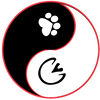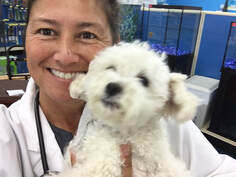 Dr. Wendy presented 2 papers at the 20th Annual International Conference on TCVM in November 2018 in Ocala. See Abstracts below. Full papers are published in Pain, Lameness, Neurological and Endocrine Disorders - TCVM Update through the Chi Institute bookstore TCVM for the Treatment of EPMAbstract Equine protozoal myeloencephalitis (EPM) is an important neurologic disease of horses most commonly caused by infection of the central nervous system by the protozoa, Sarcocystis neurona. Clinical signs can be focal or multifocal and are attributed to damage to neural tissues by invasion of the protozoa and concurrent inflammation. Many horses will test seropositive, however, only a small percentage will exhibit clinical signs which implies horses with a compromised immune system are susceptible to infection while horses with a healthy immune system are able to clear the parasitic infection without treatment. Traditional Chinese Veterinary Medicine theory views this disease pattern as a Zheng Qi Deficiency with Qi and Blood Stagnation. Premortem diagnosis in both Eastern and Western Veterinary Medicine involves a thorough neurologic exam and response to treatment. Treatment with acupuncture and herbal therapy alone or in conjunction with pharmaceuticals has a favorable prognosis. Food therapy and rehabilitation can assist the horse to return to full function. Recrudescence and reinfection when the immune system is challenged is a common sequela, therefore, long term care of EPM horses should include TCVM treatment during times when the Zheng Qi may be challenged. Using the Horse's Constitution to Treat "ADR"Abstract
Preventative veterinary medicine is an age old concept that is the basis of animal husbandry. As veterinary medicine continues to become more specialized, veterinarians delegate many of the preventative procedures; feeding, housing recommendations, parasite control, farriery, dental care, breeding and conditioning to paraprofessionals and caretakers. The majority of horse owners no longer come from agrarian backgrounds where husbandry practices for the local climate and forage was passed on from generation to generation. Media, funded by corporations that sell vaccines, pharmaceuticals, supplements and processed feeds, have become the largest source of educational material for our clients concerning the wellness of their horses. Many modern horses live in urbanized settings, have little turnout and are fed large amounts of concentrated feeds. Competition can be demanding due to travel, athletic expectations, emotional stress and artificial day lengths. Some horses are more sensitive to stress, temperature, training methods and foods. If we can recognize our patient’s weaknesses, we can be better equipped to help them. The 5 Element theory classifies a basic constitution of a horse and helps us recognize how a horse with a certain constitution reacts with his environment, lifestyle and rider. We can use the constitution to prepare a Traditional Chinese Veterinary Medicine treatment plan to support constitutional vulnerabilities to reduce the incidence of disease, lessen the risk of sports injury and keep the horse happy in its work. Educating our clients on basic care and wellness and considering constitution, diet, environment and seasonal factors will help our sporthorses stay strong in mind, body and spirit throughout their career.
0 Comments
ABSTRACT
Abstract of Thesis Presented to the Master Program of the Chi Institute in Partial Fulfillment of the Requirements for the Degree of Master of Science DETERMINING THE EFFECT OF LASER ACUPUNCTURE ON THE HEART RATE OF ACUTE-STRESSED HORSES By WENDY YING, DVM, TCVMP, CCRT AUG 2016 Committee Members Sam Wu, PhD Huisheng Xie, DVM, PhD Aituan Ma, MS, PhD Anxiety in horses affects performance, health and value of sport horses and the reputation of trainers and competitors. Current treatments include behavior modification with pharmaceuticals, acupuncture, herbal supplements, mineral supplements and food therapy. We propose laser acupuncture, given before stressful situations can decrease anxiety and improve performance and health in horses. A 2 day cross over study was performed on 24 horses who were either assigned to the treatment or control group on Day 1. Treatment horses were given laser acupuncture to reduce anxiety. Control horses were given sham treatment with the laser in the off position. All horses were fitted with a heart rate monitor and then exposed to an acute startle test (AST). Heart rate was monitored 1 minute pre and 10 minutes post AST. Peak HR and return to Baseline HR was noted. All horses were allowed a wash out period of 7 days and then assigned to the other group and results from both days were compared. 22 geldings and 2 mares ranging in age from 6 yrs to 29 yr were used. Breeds included Arabians, Quarter Horses, Warmbloods, Tennessee Walking Horses and grade horses. Disciplines included Jumpers, Hunters, Dressage, Driving, Fox hunting and Trail. Our data shows in some cases, laser acupuncture did reduce peak heart rate and decreased the time to return to baseline. Further research needs to be done with a larger group of subjects. Modifying the acute startle test depending on the level of anxiety of the breed/discipline may give more meaningful results. Quarter Horses, trail and driving horses showed a very low level of startle (ie lower peak heart rate) compared to dressage horses and jumpers probably due to their exposure to loud noises in their daily activity. This model may be used to test the effectiveness of other kinds of acupuncture treatments, herbal therapies, pharmaceuticals and supplements claiming to be effective in controlling anxiety in horses and other animals. 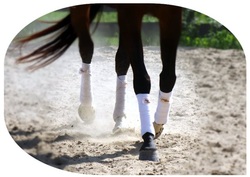 This is a great article by Kathy Farrokhzad on her blog Horse Listening. See her intro below and click on her link for the whole post. "Do you have a horse that seems to regularly trip or stumble, either in the front or hind end?The footing is good. The path is clear. There were no sudden changes to your direction. The horse is sound and you know the tack fits well. His feet are trimmed. There are no other underlying physical issues that you are aware of. Yet your horse stumbles here, trips there, and as time goes on, you learn to just quietly ignore it. After all, the horse is trying his best and there’s nothing you can do, right? WRONG! If you listen carefully, you might even discover that you are more a part of the equation than you give yourself credit for. It might be something you are doing. Or it might be something you are NOT doing! Be an active rider so you can help your horse through these moments. Your strong problem-solving skills are just the ticket to helping your horse develop better balance during riding. " http://horselistening.com/2013/07/04/how-to-ride-the-stumble-out-of-your-horse/ 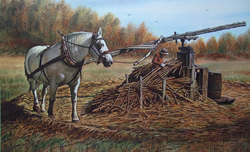 Autumn is the season for the Metal Autumn is just around the corner, the weather will be cooler and drier. According to TCVM principles, dryness becomes a major problem affecting the metal element. The Metal horse is clean, quiet, confident and disciplined. They like to follow the rules and do not like change. They learn quickly but it is quite a task to train them for a new job. They tend to be aloof. The associated meridians and Zang Fu organs of the metal are the lungs and large intestine. The external orifice is the nose and the tissue is the skin and hair. The metal element is involved with respiration and digestion due to its relationship with the lungs and large intestine but it also is deeply involved with the skin and hair coat and the immune system. As the seasons change from hot humid summer to cooler drier fall weather, the lung can be weakened by the dryness. This leads to symptoms such as dry flaking skin, dry nasal cavity, frequent nose bleeds, sore throat, coughing and constipation. The weakened immune system leaves us open to infection by external pathogens, ie virus, bacteria, mold and allergens. Drinking enough water and avoiding losing too much fluids are always important, but are even more so at this time of year. After a hot summer with numerous reminders to rehydrate, cooler temperatures cause us to take in less water. You don’t feel hot and parched so you drink less. This makes you more susceptable to the effects of dryness as your mucosa in your nose, mouth and throat ( your 1st line of defense against pathogens) dries out and becomes less functional. Symptoms of dryness include impaction colic, respiratory distress of COPD, skin itching, flaking, rain rot, nasal discharge, susceptability to respiratory diseases, decreased energy, cracked hooves and dandruff. So what can you do to prepare for the fall season ? Start with food therapy. Eat more soups, stews or cooked vegetables. This will increase your water intake and cooked food is easier to digest and warming so boosts your qi. Cooked yams or pumpkin with ginger is a good addition to your animal’s diet at this time of year. Pear is also an excellent choice to tonify the lung. Pear reduces cough, relieves dryness and tonifies the qi. Any yellow, orange and/or red foods are good to incorporate into the diet, so bananas, lemons, apples, beets, yams, squash are great to incorporate into the diet. Grief is the emotion of the metal. Your horse may seem sad or depressed with the shortening of the days. This is a time of the year to be reflective. Look over your goals for your horse. Is it time for a rest before the season gears up in the winter early spring or is it time to push on for the finally before the winter ? Organize and make a plan for your metal horse that involves rest or sufficient support to get him through the end of his season. For people, we say now is the time to let go of negative emotions. For horses, they may have more off days than usual in the fall. Maybe it is time for a trail ride rather than dressage school or do shorter sessions with rest and praise in between sets. If symptoms persist, seek additional treatment such as acupuncture, herbal therapy and chiropractic care. An immune supplement such as Standard process immune support can help boost qi and fight off colds. Archived from 5elements4animals.com originally posted on Jan 6, 2011 The 5 Element theory, aka Wu Xing refer to the 5 elements in the natural world, Wood, Fire, Earth, Metal and Water and their inter-relationships.
"The 5 Element theory was first formed in China around the time of the Yin and Zhou Dynasties (16th century BC to 221 BC). Later, it was adopted into medical practice, thus becoming a founding theory of Traditional Chinese Medicine. The 5 element priciples can describe the nature of the Zang-Fu organs, the inter-relationships between organs and the relationship between the animal body and and the natural world. Thus, the theory of the 5 Elements, together with the theory of Yin-Yang, serves to guide clinical diagnosis and treatment" ....(Dr. Xie, Traditional Chinese Veterinary Medicine, volume 1, fundamental principles.) I will go into each element separately in more detail in later posts, but today will give a quick overview. I use 5 element theory to diagnose the personality of the animal and his/her human companions. Many emotional problems of animals are direct reactions to their environment and caretakers so if i can reduce stress and conflict in the environment, both animal and human can be happier and healthier in their relationship. A wood animal is confident, active and athletic. They can be superstar performers but are sensitive to stress and are easily angered and tend to be crabby and impatient. They will be alpha in the herd/pack and will need a strong and fair trainer. A fire animal is friendly and hyper excitable. They are excellent show animals and love to be loved and come alive in the show ring or in front of a crowd. They are inquisitive with strangers and like to call to their herd mates/bark and are always moving. A fire needs a smart, watchful trainer with a full bag to tricks to keep an easily distracted fire engaged. An Earth animal is friendly but lazy and laid back. They enjoy sleeping and eating and are eager to please. They are good workers once they get going on a task but tend to be slow and are not motivated to be superstars. They are happy to follow along on a trail ride and don't need to be first in line. Earths can be stubborn and become crabby if they feel forced into performing. The earth is food motivated and a smart trainer will use treats and positive reinforcement. A Metal animal is very neat, quiet and confident. They are disciplined and know their job. They can not think outside the box and don't know why anyone would want to. They are in the middle of the pecking order and are happy to be turned out alone or be an only pet. They are a trainers dream because once taught a task, will be happy to perform it the same way over and over, however they are very difficult to reschool to a new discipline. The Metal needs an organized, disciplined and determined ie Metal trainer, to be reschooled but once trained is a school master. A Water animal tends to be fearful of strangers both human and other animals. They can kick out or bite when afraid. They are usually submissive to all other animals in the pack/herd. They need a patient, kind and confident trainer who can give them emotional support. |
�
Dr. WendyPractices Traditional Chinese Veterinary Medicine in Sarasota, Florida Categories
All
Archives
December 2023
|
|


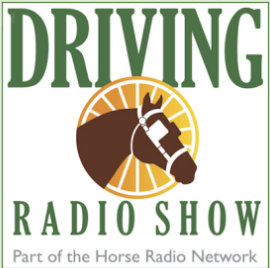
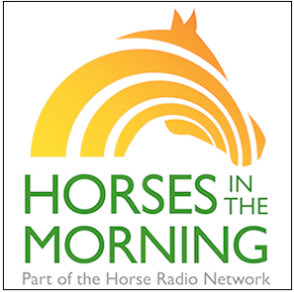
 RSS Feed
RSS Feed

